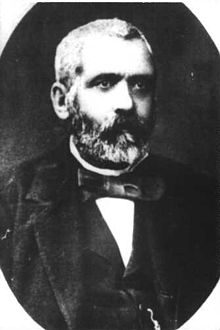Dragan Tsankov
| Dragan Tsankov Драган Цанков |
|
|---|---|
 |
|
| 3rd Prime Minister of Bulgaria | |
|
In office 7 April 1880 – 10 December 1880 |
|
| Monarch | Alexander |
| Preceded by | Kliment Turnovski |
| Succeeded by | Petko Karavelov |
|
In office 19 September 1883 – 11 July 1884 |
|
| Monarch | Alexander |
| Preceded by | Leonid Sobolev |
| Succeeded by | Petko Karavelov |
| Minister of Foreign Affairs | |
|
In office 7 April 1880 – 10 December 1880 |
|
| Premier | Himself |
| Preceded by | Grigor Nachovich |
| Succeeded by | Nikola Stoĭchev |
| Personal details | |
| Born | 9 November 1828 Svishtov, Ottoman Empire |
| Died | 24 March 1911 (aged 82) Sofia, Bulgaria |
| Political party | Liberal Party |
Dragan Kiriakov Tsankov (Bulgarian: Драган Киряков Цанков) (9 November 1828 – 24 March 1911) was a Bulgarian politician and the first Liberal Party Prime Minister of the country.
Born in SvishtovTsankov was initially a civil servant in the administration of the Ottoman Empire, who in the 1850s gained a reputation as a supporter of the Bulgarian Greek Catholic Church. His paper Bũlgaria appeared in Constantinople in 1859 and espoused his religious positions. Funded by France, the paper argued that a Uniat with Rome was the only solution to Bulgaria. Indeed, Tsankov, who was educated by the Jesuits, helped to form the Uniat church in Bulgaria in 1861.
Later he became closely associated with opposition to the Ottomans and the independence movement. Tsankov was initially opposed to the April Uprising but he soon changed his opinion and began to be active in support of independence. He served as deputy to Nayden Gerov in the Governorship of Svishtov during the brief period of Russian administration in Bulgaria.A leading figure in the drive towards independence, he became respected as the voice of moderate liberalism, as he was prepared to work with the Conservatives after 1879.
After some failed attempts to form a Conservative-led administration, Tsankov was appointed as Prime Minister on 7 April 1880 with plans for a wide-ranging raft of reforms. His new reforms, which included the establishment of a militia, limited rights for Muslims and attempts to limit the power of the Bulgarian Orthodox Church alarmed Alexander of Bulgaria, who feared the possibility of a liberal revolution. A series of foreign policy errors involving relations with Austria-Hungary followed (largely caused by the lack of communication between Tsankov and the Tsar) and his ministry was forced to resign before the year was out.
...
Wikipedia
